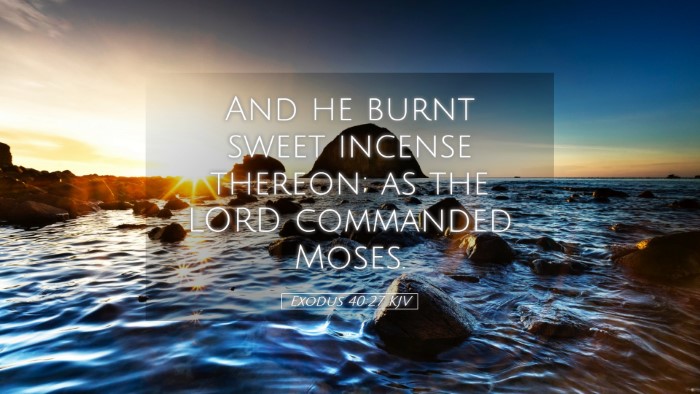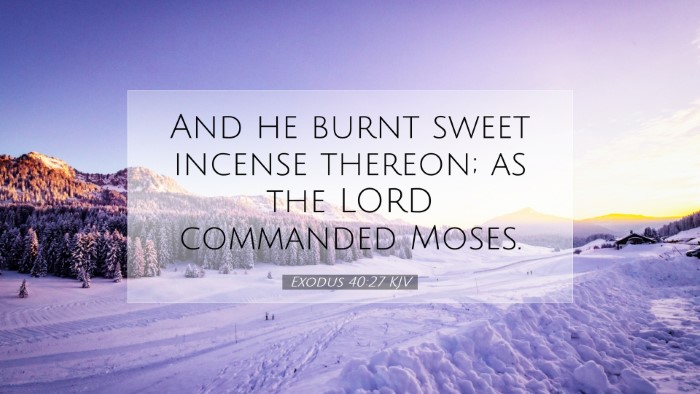Exodus 40:27 - Commentary and Insights
Verse Context: Exodus 40:27 states, "And he burnt sweet incense thereon; as the Lord commanded Moses." This verse is positioned within the narrative of the Israelites' journey through the wilderness, emphasizing the importance of proper worship and adherence to God's commands.
Overview of Public Domain Commentaries
This commentary on Exodus 40:27 draws insights from several respected sources in biblical exegesis, including Matthew Henry, Albert Barnes, and Adam Clarke. The multifaceted understanding provided by these theologians provides a rich perspective on the implications and significance of worship in the biblical tradition.
Matthew Henry's Commentary
Matthew Henry focuses on the significance of the act of burning incense as prescribed by God. He notes the following key points:
- The Symbolism of Incense: Henry highlights that incense symbolizes the prayers of the saints, representing how the offerings of worship rise to God. The sweet aroma can be likened to the pleasing nature of sincere devotion and prayer.
- The Importance of Obedience: He strongly emphasizes the necessity for obedience to God's specific commands. The phrase "as the Lord commanded Moses" underscores that worship must not be conducted according to personal preference, but must adhere to divine instruction.
- Preparation for Worship: Henry also points out that the burning of incense was part of the sacred preparation for worship in the tabernacle, emphasizing its role in setting apart a holy space for communion with the divine.
Albert Barnes' Observations
Albert Barnes provides a detailed exploration of the ritual aspects surrounding Exodus 40:27:
- The Role of the Priests: Barnes discusses the priestly role in the act of worship. He notes that Aaron's actions in burning the incense were vital to maintain the sanctity of the tabernacle, reflecting the priests' function of mediating between God and the people.
- Divine Commands and Worship: Barnes echoes the sentiment of obedience by explaining how this specific command to burn incense was instilled to foster a sense of reverence and order in worship, showcasing that God desires worship done in a manner that reflects His holiness.
- Incense as Acknowledgment: Barnes further elaborates that the burning of sweet incense is an acknowledgment of God's presence and authority. It signifies a conscious effort by the worshippers to honor God’s sovereignty through their rituals.
Adam Clarke's Contributions
Adam Clarke brings an interpretative lens to this verse with his characteristic analytical approach:
- Cultural Context of Incense: Clarke discusses the broader cultural practices of incense in ancient Near Eastern religions while distinguishing Israel's practice as particularly focused on the worship of Yahweh, emphasizing purity in worship.
- Practical Application: He articulates the importance of introspection in worship, suggesting that the act of burning incense should prompt believers to reflect on their own lives and their relationship with God, understanding it as a call to holiness.
- Theological Implications: Clarke notes the theological significance of the act, asserting that worship is relational; it fosters communion with God and underlines mankind's response to God’s revealed nature.
Thematic Connections
From the insights gathered from these commentaries, several overarching themes emerge:
- The Necessity of Divine Instructions: All sources focus on the need for adherence to God's specific commands in worship, reaffirming that the relationship with God is grounded in obedience.
- The Significance of Worship as an Act of Community: The act of burning incense is not merely a personal ritual but a communal expression of faith that brings the people together in reverence before God.
- Worship as a Transformative Experience: The ritual symbolizes a transformation—where mundane activities are elevated to sacred acts when done according to divine specifications, inviting God's presence into the community.
Conclusion: Relevance for Today’s Believers
The insights from Exodus 40:27 speak profoundly to contemporary believers, pastors, and theologians:
- Intentional Worship: The verse serves as a reminder to approach worship with intentionality and reverence, ensuring that it aligns with God's will and commands.
- Collective Responsibility: The focus on communal worship encourages believers to actively participate in the life of the church, fostering unity and shared devotion among the community of faith.
- Holistic Approach: Finally, this commentary enriches the understanding that worship is holistic—inviting one to engage not just physically in rituals but spiritually in the transformational process of drawing closer to God.
As such, Exodus 40:27 continues to challenge today's believers to examine their worship practices faithfully and authentically.


